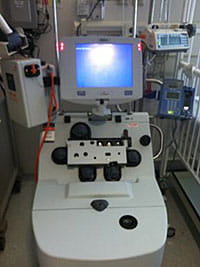What is Pheresis?
Pheresis is a treatment done to remove a harmful substance from one or more of your child’s organs that may causing the body to work incorrectly. Pheresis is used to remove or treat:
- excess white blood cells, as in leukemia
- misshapen red blood cells, as in sickle cell disease
- extra red blood cells
- cholesterol
- inflamed T-regulator cells, as with lung transplant rejection
These disorders may cause organ dysfunction or pain in your child. Pheresis is done to help treat these problems.
Your child will have an IV or a plastic tube, called a catheter, placed in a large vein. The pheresis machine attaches to the catheter or IV and removes the blood, cleans it, and returns the “good” blood back to your child.
What to Expect

The treatment may last several hours and may need to be repeated. The recovery of organ function and reduction of pain may vary.
When having pheresis, your child may experience:
- reaction to donor blood / plasma that is used in the treatment
- infection in the catheter
- decreased blood clotting
- numbness and tingling around the mouth, which should be reported to the nurse
- trouble with the catheter, that is, not working well and causing a delay in treatment
- dizziness or feeling “light headed”
- sensitivity to sunlight
Special Instructions
- Help prevent infection by always washing your hands before entering your child’s room and before you leave. Check to make sure everyone does the same. Don’t be afraid to remind anyone who comes into your child’s room to wash their hands.
- Your child will need to rest quietly during this treatment. You may want to have books, videos and quiet activities available for your child. A Child Life Specialist can also help with quiet activities for your child.



